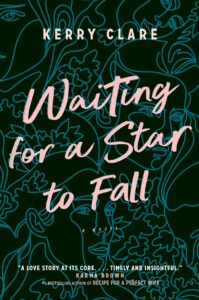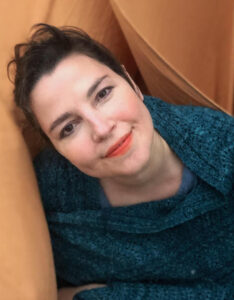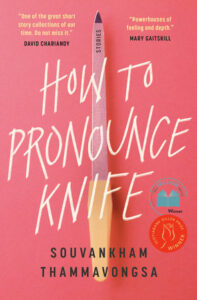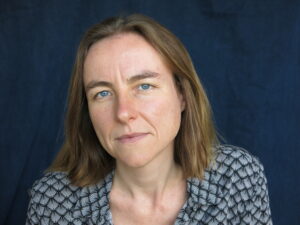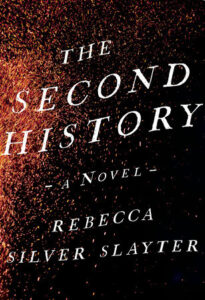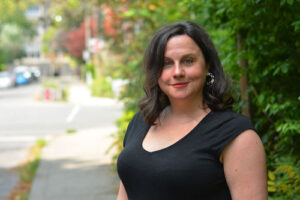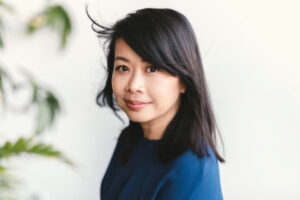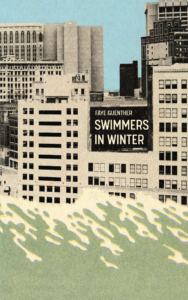August 4, 2022
That’s not how I see it
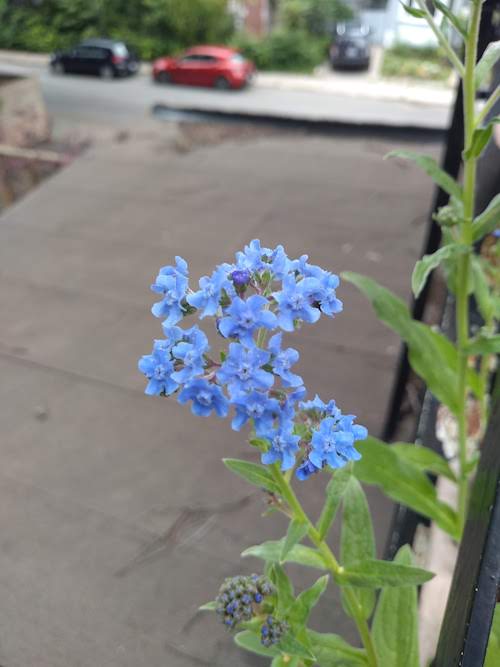
I’ve been sort of obsessed with Katherine May lately, whose podcast archives I’ve not delved so deeply into (yet!), but every time I listen, I come away with a gorgeous revelation that’s blown my mind. I’ve included some of these amongst my “Gleanings” lately, including the following, from her conversation with Emma Dabiri: “We all end up using the same language over and over and the effect is just deadening. You just think, I’ve heard that, I know that already, and the brain gets over it. There’s nothing interesting there anymore because we’ve all said it.”
And I think about that all the time, the affect of everybody speaking from the same script with permissible takes, and how meaning gets stripped of all of it. For example, what does toxic even mean? Or gaslighting? Or narcissist. When you’re using buzzwords, it’s time to stop talking, and start thinking, and this is what galls me about everybody who thinks they’re so brave in critiquing the flaws in progressive politics, because they too all start speaking from their own reductive scripts (and subscribing to obligatory substacks) and it’s so boring. When, all the while, thinkers like Katherine May are applying their own rigorous analysis (and sense of curiosity and wonder) to these very same issues, and it’s actually deepening connection and thoughtfulness, which is everything we need right now.
I signed up for May’s Patreon at the conclusion of the podcast where she talks about how one need not increase one’s own suffering in order to meet the hardship in the world, and I so needed to hear that. (There was also something she wrote in an instagram post ages ago about how none of us are obligated to watch over the entire world. Yes, there is a part of the world for which we’re responsible, but there are limits to that responsibility, and I needed to hear that too.)
I also love this line from her recent announcement about her forthcoming book: ” My books always have their feet in uncertainty. They don’t come from a desire to hand down wisdom, but instead to acquire it.”
And, most essentially, this line, from her newsletter, delivered on June 30, in the wake of the overturning of Roe vs. Wade: If nothing else, keep making the world beautiful. Keep singing and dancing, drawing and planting gardens. This is no insignificant thing in the face of a movement that wants to make everything plain and ugly, cruel and sour. There is radicalism in refusing to judge. There is radicalism in listening. There is radicalism in saying, gently, ‘That’s not how I see it.’
There is radicalism in saying, gently, ‘That’s not how I see it.’
I’ve been thinking about that steadily ever since, as I continue to think about and evolve in the ways in which I want to be political. Because my former aspirations to be the witchy woman ever with the placard on a broomstick have been dampened by seeing neighbours* who are my political opponents taking up the very same tools to what I regard as most nefarious ends. I’ve seen masses take to the streets in the last few months, and the effect has been horrifying, and I don’t want to be part of anything to do with that, and I really am starting to think that it’s all—whatever your side, with the rage and contempt—feeding the same terrible, monstrous machine.
So, what to do?
There is radicalism in saying, gently, ‘That’s not how I see it.’
To live my life with integrity, according to my principles, gently, and honourably. My intention not to to beat anyone over the head with a placard, metaphorically or otherwise, not to try to convert everyone around me to my way of being and my way of thinking, because I don’t want to live in a world where everybody thinks the same—how uninteresting is that?—and, when I meet opposition, to say gently, “That’s not how I see it.” Not that I’m necessarily correct, even, in how I see it, but just to continue to complicate things, thoughtfully, generously.
There is radicalism in saying, gently, ‘That’s not how I see it.’
October 13, 2021
Class Reunion: ENG 369Y 20 Years Later
During my third year of undergraduate studies, from 2000-2001, I was part of ENG 369Y, a creative writing workshop led by Dr. Lorna Goodison through the Department of English at the University of Toronto.
For so many reasons, many illuminated below, this class would be an unforgettable experience, though it seemed especially remarkable when—two decades later—four of us from the class would all be publishing books within the same year and a bit.
- Souvankham Thammavongsa’s How to Pronounce Knife was published in April 2020, and it was awarded the Scotiabank Giller Prize that year, as well as the 2021 Trillium Book Award, among other accolades.
- Faye Guenther’s Swimmers in Winter came out in August 2020, and it has been a finalist for both the Toronto Book Award and the 2021 ReLit Award.
- My book, Waiting for a Star to Fall, arrived in October 2020, and the Montreal Gazette called it, “Subtly complex […a] romantic drama tailor-made for the #Metoo age.”
- And Rebecca Silver Slayter’s The Second History found its way into the world this summer, with no less than Lisa Moore writing that it’s “one of the most honest renderings of romantic love I’ve ever read. [A] truly mesmeric story, tender, unflinching, quakingly good.”
To me, the serendipitous occasion of our new releases after all this time seemed like an splendid opportunity for us to reconnect and reflect on our time together, as well as so much that we’ve learned about writing in all the years since then, and so the four of us shared our thoughts and ideas via email.
tell us about 20 years in the writing life, about the trajectory of your writing life since our class together in 2000.
Kerry Clare: I don’t think I had a focussed relationship to writing at all in the first ten years after our class together, even as I completed a MA in Creative Writing at the University of Toronto from 2005-2007. There is a line in Annie Dillard’s The Writing Life that I may have misremembered, but it’s about a superficial idea of writer-dom being analogous to one admiring the way one looks in a particular hat, and I always thought she was talking about me, which was mortifying.
When I finished graduate school, I worked for two years reading financial documents all day long, which was not fun, but gave me stability and a salary, though little in the way of creative inspiration. It also gave me parental leave benefits, which I used when I had my first child in 2009, and becoming a parent really seemed to up the stakes for me writing-wise. I became invested in the world in a more meaningful way, and therefore had more to write about. My first big success in writing was an essay about new motherhood I published in 2011, and this led to my first book, the essay anthology The M Word: Conversations About Motherhood, which I edited and was published in 2014.
At this point, I wasn’t sure that writing fiction was going to be my destiny, and was even making peace with that (throughout this entire period, I’ve been blogging, which has been a creative lifeline), but then something clicked shortly after my second child was born and I finally figured out how plot works. My first novel, Mitzi Bytes, was published in 2017, and I’ve been writing them ever since, and though I am constantly terrified that one day I won’t know how to do it anymore, it seems to keep happening.
Souvankham Thammavongsa: I am not a very good example of a writing life because my trajectory isn’t a simple one and it is not for everyone. I don’t think anyone would want it. I worked for fifteen years in the research department of an investment advice publisher, I counted bags of cash five levels below the basement, I prepared taxes. This work helped me write what I want and it didn’t take away my desire to write. I still have that from 2000, this desire to write, but it wasn’t anything someone taught me.
Faye Guenther: I stayed at the University of Toronto to do undergraduate and graduate degrees in English. Then I went to York University and did a PhD in English. While I was a student during those years, the jobs I had to support myself weren’t related to writing, but they showed me things about the world and this is useful to a writer. I’ve found that no matter what you do, the key is to make the time to write. My writing life has also been shaped by who I’ve met along the way, including fellow writers. In 2017, I published a chapbook of poems and short fiction, Flood Lands, with Junction Books. In 2020, I published a collection of short fiction, Swimmers in Winter, with Invisible Publishing.
That is probably most of what I’ve learned in these two decades. How to take in all the advice, all that you’ve learned from other things you wrote, from things you read, from other writers, and then listen very hard for the tiny sound of this book calling for what it needs from you.
Rebecca Silver Slayter
Rebecca Silver Slayter: I decided to stop writing not long after that workshop. I think, to reverse what Souvankham said, I worried my desire to write might be something someone had taught me. That I had lost track of why I wanted to write at all.
So I stopped for a year. Or two. Or three? It felt like forever because I was 20-something and everything was forever.
And meantime I decided to make my life and work writing-adjacent. I interned at Quill & Quire and The Walrus. I worked for a startup children’s publisher. I did odd jobs to complete the financial math, yardwork and errands. Eventually I was hired for my dream job, working as managing editor for Brick literary journal.
Sometime in the midst of that, I met my husband, and told him, proudly, how I had made the tough, mature decision to give up writing, and he listened and nodded and then said, I know you are a writer, with such certainty that I didn’t know how to doubt him and I began writing again. And I found to my great joy what I had been missing in those earlier writing years; a desire to write that easily overtook the desire to be a writer.
I did graduate studies in Montreal, where I wrote the first draft of my first novel, In the Land of Birdfishes. When I graduated, I returned to Nova Scotia, and bought a house for a song in Cape Breton, which I will be renovating for the rest of my earthly days.
This is for me a very good place to write, near the ocean and the highlands, in a community where music and storytelling are woven into everyone’s daily life. Here I published my first book and then wrote and rewrote and rewrote my second book, which was just released this summer: The Second History. It took me eight years from first draft till now, mostly because I tried to write it faster than I’m able to. It turns out I’m a writer who needs to take my time…
That is probably most of what I’ve learned in these two decades. How to take in all the advice, all that you’ve learned from other things you wrote, from things you read, from other writers, and then listen very hard for the tiny sound of this book calling for what it needs from you.
what was the best thing the writer you were in our classroom had going for them? And what writing advice would you give that previous incarnation of you? (Though would you even have taken it?)
ST: My intuition. I listened to everyone, and knew when not to. This taught me how to pick through edits. When we see edits, sometimes it’s about the person and their life experience and it doesn’t mean they are right or know but you have to be generous and allow them to have their thoughts.
I wouldn’t give myself any advice. I think advice can be a disservice to a writer. There’s a lot I didn’t know and I want myself to not know and to live in that not-knowing in order to know it. I want myself to encounter and work through those difficult and lonely moments. I don’t want anyone to hold my hand or do me any favours or make it easier or easy. I like the difficult, and I want to continue with that difficulty.
RSS: One of my clearest memories of that workshop was of Professor Goodison saying, as we discussed one of my poems, “You come from preachers, right?”
I was tongue-tied with confusion. “What?”
“Your people, they’re preachers, right?”
I had absolutely no idea what she meant. “No….” I stammered.
“Then why are you preaching at me?” she asked.
Oof. Caught. I was constantly preaching. Trying to find a much-too-simple way of understanding much-too-large things. I had a weakness for sentences that began like “Love was…”
I think somewhere in this is both my weakness and strength as a writer (probably as a human too). It is writing-in-bad-faith to just polish up pretty turns of phrase that sound truish. To go around making tidy summaries of untidy things. But… I think if I mine deeper I can find underneath that impulse what drives me to writing still, and to reading itself… The sense that there is some luminous other way of noticing the world that will make it brighter, stranger, more visible. That certain words can be incantatory, a pathway to looking again and seeing more.
I have two small children, and have found it astonishing to witness language dawn within a person who formerly had none. How each child altered a bit around the language they used. How they learned what it was then to be nervous, even tired, even thirsty. How what began as the ragged, indeterminate longing of a baby’s howl became so clear, so precise, so unmysterious. And I miss a bit the mystery. The wonder of watching a peer being who doesn’t know what yesterday is. But I think there’s another way that language can give us back what experience has made ordinary. And I think that’s what I was searching for twenty years ago and search for still, but with a few degrees more purpose. And a lot more joy.
So I would maybe advise myself something like this: First, don’t write any more poetry. You are very bad at it. And for a time, don’t write at all. Wait until the desire to write is something you have to resist. Wait until it wells up in you. And then go find the joy of writing words that make you look again, more deeply.
I wouldn’t give myself any advice. I think advice can be a disservice to a writer. There’s a lot I didn’t know and I want myself to not know and to live in that not-knowing in order to know it.
Souvankham Thammavongsa
FG: I remember being openhearted and creative. The writing advice I would give my earlier self is to be bolder. I think when boldness is combined with a practice of being open with yourself and to the world, there is a sharpening of creative focus that can happen and a strengthening of creative perception, no matter what challenges life brings.
KC: The writer I was in our classroom had no idea how much she didn’t know, and far more confidence that she deserved to have, and I’m so happy she did because being 21 is hard enough. I was not a serious person or a serious writer AT ALL. (I remember that Souvankham appeared to be both, and it was such a powerful example for me, though I think I was still too young to fully appreciate it.)
What a tremendous opportunity to develop my skills that class should have been!! But I did not work all that hard, honestly, too busy checking out my look in the hat, remember? I mainly wrote poetry because you could finish a piece in a few minutes. This did not mean my poetry was good, however, although I think sometimes some of it was.
If I could give that writer I was any advice it would be to write something REAL, instead of something you think sounds like something that could be real. (And find writers you love, instead of reading all the writers you’re supposed to love.)
For the record: I would not have listened.
what roles have literary journals and small presses played in your writing career?
RSS: I know literary journals and small presses better as a worker than as a writer. But I am shaped permanently by my years at Brick literary journal, and by the trips I made then, twice a year, to Coach House Press, where the journal was designed at that time.
The Coach House basement was a kind of church I visited like a disciple of those beautiful machines for cutting pages and laying type … and of the people who made them run and knew the stories of an older Toronto and the mesmerizing adventures then had by not-yet-famous writers. In a way that is both corny and essentially true to me, that is what I feel a tiny part of when I write: all the people in all those tiny offices and studios and nooks making small-press books and magazines; their labours of love, their care and bravery, those parallel arts of ink and paper, alongside those of prose and plot.
They taught me what was foundational to writing; the courage and the care of the work. And the kinds of community it can build.
FG: Reading literary magazines gave me an awareness of community. They were the first space where I was published, and I know this is true for many writers. Smaller presses often foster innovative and ground-breaking work. They frequently publish voices and stories that historically have been marginalized. I think smaller presses are important for energizing and sustaining a vibrant creative culture.
My first piece of published fiction was in The New Quarterly in 2007. I will never forget the joy of receiving that acceptance
Kerry Clare
KC: My first piece of published fiction was in The New Quarterly in 2007. I will never forget the joy of receiving that acceptance, especially in the wake of the novel I’d written for my Masters thesis that went nowhere (because it was boring!) because I was really feeling kind of discouraged, and then this message from the universe arrived suggesting maybe I should keep going after all. In the next few years, I would publish pieces in TNQ and other journals, and the high of an submission being accepted has never diminished for me. And then Goose Lane Editions, a remarkable Canadian indie press with an impressive history, published The M Word, and did the book such justice. Without literary journals and small presses, I’d be nowhere.
ST: Literary journals teach you things a writing class or editor or a dear friend and family cannot. They don’t love you and are not beholden in any way. They teach you about rejection—what that feels like, what to do with it. They are often the first place where we get to see ourselves in print. It’s important for a writer to understand the difference between seeing yourself in print and publishing a book. They are not the same.
what are your favourite memories of our class?
ST: I remember the talent and fun. There were so many writers in that class who are more talented, more ambitious, more interesting…but they aren’t here, or with books. They became lawyers and engineers and professors. I always keep that in mind. Having a book doesn’t mean I am good.
KC: I have so many memories! I don’t know if we were particularly interesting as a group, or if it was the work of Professor Lorna Goodison in creating community, or just the particular mix of experience and personalities in our class, but I felt very connected to everyone. I think we were a well written cast of characters.
I remember Souvankham on the very first day, and how she impressed me so much with her sense of herself. I remember we had to write a poem inspired by postcards, and mine had a field of sunflowers and said, “Welcome to Michigan,” and I wrote a poem with the line, “I won’t forget the motor city.” I remember REDACTED who wrote a poem with the line, “Let’s make love in the astral plane,” and I was seriously impressed by how sophisticated he seemed. And someone else who wrote a poem about someone sucking on her toes while listening to Robbie Robertson sing “Somewhere down the crazy river.” Everyone seemed to be having a lot more sex than me. (One could not have been having less sex than me.)
I remember Faye seemed especially interesting, partly because she seemed kind of badass with a shaved head, and we always sat in opposite corners of the room. And how I was in love with the name “Rebecca Silver Slayter,” which belonged to the woman who often sat in the same corner as me and whose work I felt very drawn to.
I think it’s kind of wonderful that in addition to the four of us, plenty of others in that group have gone on to very interesting careers in academic, television writing, and more.
One of my memories of the class was discovering what a literary reading could be—the ways prose and poetry can be shared beyond their existence as words on a page and become something like music in a public space.
Faye Guenther
FG: I’m grateful to have had the opportunity to learn from our teacher Dr. Lorna Goodison. One of my memories of the class was discovering what a literary reading could be—the ways prose and poetry can be shared beyond their existence as words on a page and become something like music in a public space.
RSS: This sounds like very cheap, opportunistic flattery, but honestly, though I remember well many of the talented, interesting writers in the class and their poems and stories, what I remember most clearly is the three of you.
I remember how beautifully Souvankham’s work was always laid out on the page in lovely, tiny type—the form so perfectly echoing the work itself, the grace and economy and polish of her words; how her work seemed always already complete, and I was stumped on how to write any feedback that didn’t just feel like tampering.
How Kerry’s writing was funny and powerful at the same time, and I hadn’t even known that was possible. How she seemed so at home both on the page and in the classroom, warm and open and at ease in a way that awed me. I remember Faye’s compassion for her characters, their rich interiority. How reading her stories felt like someone whispering in your ear, that intimate.
My strongest memory of the class was the first one. When we went around the room and each offered up our names.
Souvankham was near the end, seated at the table perpendicular to the one where Professor Goodison sat.
After she said her name, Professor Goodison asked, “So what do you want to be called?”
I was caught off guard by the question, but Souvankham answered clearly and immediately. Without blinking or skipping a beat, she said: “I want to be called a writer.”
Professor Goodison looked at her and Souvankham looked back. Then she said, “I’m going to call you Sou.”
And I was as astonished as if Souvankham had wafted out of her seat and up into the air between us. I was at that time so uncertain, so full of twenty-one-year-old desires to be interesting, to be brave, to be invisible and/or famous. I would have probably told Professor Goodison she could call me whatever she wanted. Or tried to guess what she might prefer me to be named.
Year by year over these last twenty, I get a little closer to what Souvankham already had then. That certainty. That clarity of purpose and identity as a writer that struck me silent when I was twenty-one.
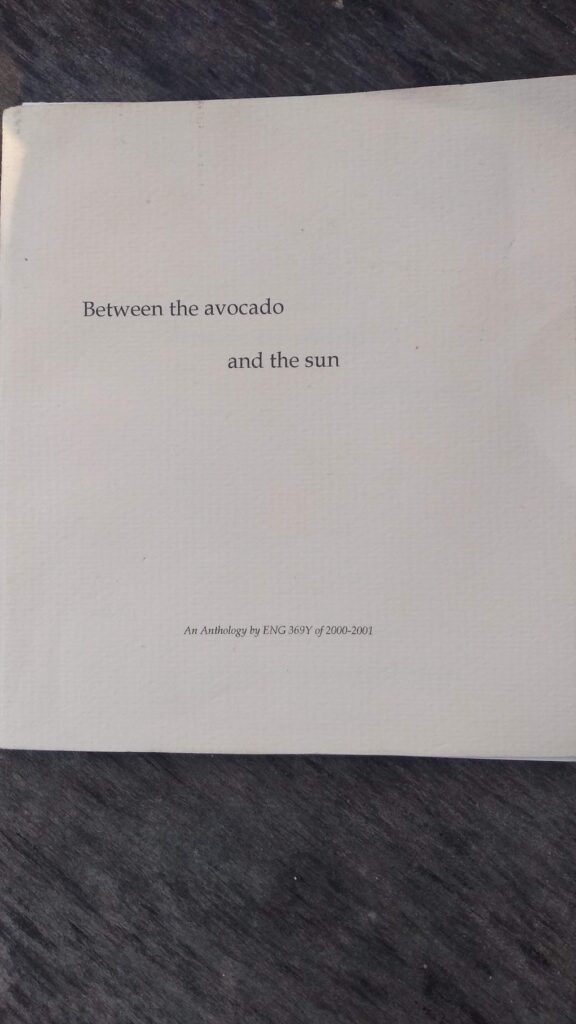
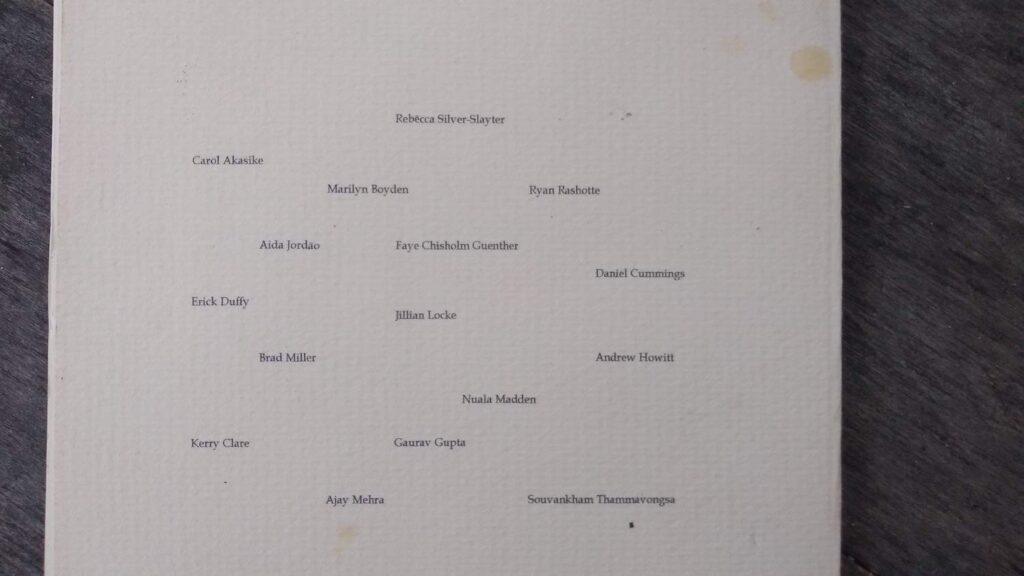
August 31, 2021
Sidewalk Stories
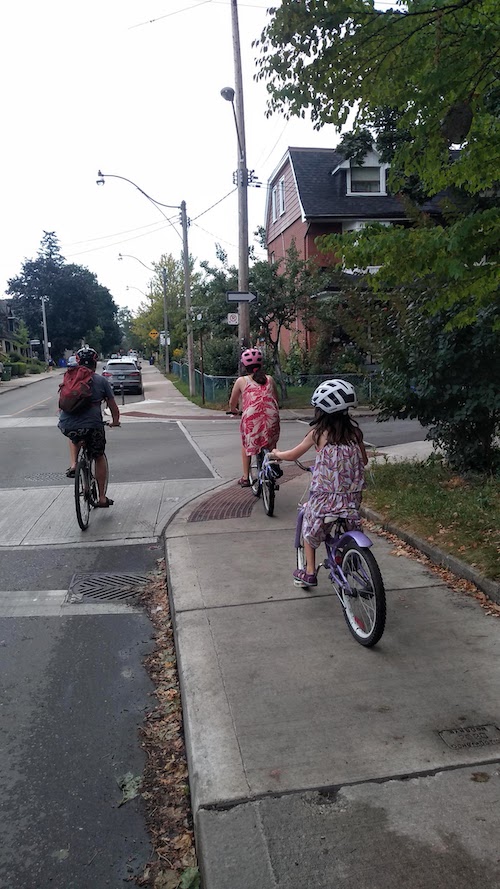
There were so many children I swore I’d never have—the three-year-old with a soother; the baby in my bed; giant child in the stroller—but one I’ve successfully managed to keep at bay was Annoying Bicycle Bell child. The bane of my pedestrian existence, Annoying Bicycle Bell child is the kid riding his bike along the sidewalk who wants you to get out of the way so he can get by, and demonstrates this by ringing a bell. As though you weren’t two human beings, one of whom has a voice, the other who has ears. I found ABB child so insufferably rude, and omnipresent on my sidewalk journeys, that it got to the point where I would turn around and exclaim, “You know, you could say ‘excuse me.'”
My children always say ‘excuse me’ when they’re riding their bikes on the sidewalk. They don’t always ride their bikes on the sidewalk either, because there is an impressive spread of bike lanes throughout downtown Toronto these days that makes cycling safer and accessible for all of us, but on streets without bike lanes where traffic can be treacherous, I make the choice that most likely to have my beloved babies not be hit by a truck.
And so they ride on the sidewalk (not fast!), and they ring their bells when they’re riding past cars with occupants inside to avoid being doored (as they do when they’re riding in the cycle lanes), but when they’re faced with other people who are also using the same sidewalks in other ways, I’ve taught them to say, “Excuse me!” and then to say, “Thank you!” once the person has moved aside to let them pass.
I am writing about this now not to be smug (though I am smug, I am always smug, from which I’ve learned the lesson of smugness: “whenever I’m smug about anything, it bites me in the ass”), but instead because teaching my kids to engage with public space and other people this way is not just about sidewalks and cycling.
It teaches them their entitlement to take up space, to use the space that’s provided in a way that’s safe. It also teaches them not just entitlement, which can be obnoxious, but gracious entitlement, which is not about apology but instead about respect for our neighbours and to the people we share spaces with (and for ourselves!). Not being rude is really important.
They learn too that everything about living among other people is about negotiation, and we owe those people something, but also that they owe us the same consideration in return.
And finally, I like too the way it’s made them comfortable talking to adults, and how it makes speaking up and advocating for themselves into a habit.
Bicycle bells are important to have, but knowing how to use one’s voice is even better.
June 26, 2020
Our Job is to Hear Them

I have been thinking a lot about how those of us who are white people can continue to have conversations about race, but also about how “conversations about race” isn’t most effective when it’s just us yelling at other white people. And this is not to say that white people don’t need to be yelled at, BUT I am not sure the white people in my feed are necessarily those who most benefit from the “Things to Stop Saying to Black People” memes that begin with, “Quit asking us if we twerk.” I have never asked anyone if they twerk. I don’t know what twerking is.
But those of us with social skills enough to, say, know not to touch people’s hair, still have thinking to do, racist biases to unpack. Which is why I keep clicking on these memes, because I want to do this work, to figure these things out. But I think that memes are not going to be where the answers are found, and that original thinking (and learning) is required instead.
And so I want to write about what I’ve learned and am still learning about listening, and about how listening is more important than understanding. (“But you see, Meg, just because we don’t understand doesn’t mean the explanation doesn’t exist.”) For a long time, my friend would talk about how conspicuous he felt as a person of colour in my hometown—and I just assumed he was being sensitive. I used to hear stories of racism, and assume there must be more to the story, because things like that don’t just happen. And then one day another friend told me that her son was being teased for the colour of his skin, and I replied, “But that doesn’t make sense.” Because so many kids in the class were people of colour, was what I meant. And she gave me this look, a look that turned my world around. In that look I saw the fact that I have no idea, and that to define my understanding of the world by the limits of my own experience is such a fallacy, that it’s ignorance. And who would want to live in the world like that?
I will tell you that when I heard about the death of Regis Korchinski-Paquet, killed when police arrived at her apartment during a mental health episode here in Toronto, I was unsure what role the police had played in her death, figuring it must have been an accident. Because “things like that don’t just happen.” But of course this is when the world was still reeling from the murder of George Floyd, killed when a police officer knelt on his neck for nine minutes. And if we hadn’t seen a video of that, would anyone have believed it?
But of course, plenty of people would have believed, their life experience having established that police brutality is an unremarkable fact of life instead of an aberration. And those of us who have remained ignorant? It’s only because we weren’t listening, because certain voices matter more than others, because we’ve been so invested in the status quo, in our comfort, that we’ve failed to read the world.
So what now? Because the point is never to be one’s own awakening. The point is what we do with our knowledge, with our power. Voice your solidarity with Black Lives Matter. Call your mayor and city councillor and demand police defunding. Support Black-led businesses and organizations. Keep learning, keep reading. (I recommend Jesmyn Ward’s Men We Reaped, and Desmond Cole’s The Skin We’re In.)
Keep listening.
The stories are there. Our job is to hear them.
January 17, 2017
Reconciling

The first definition of “reconcile” in the Merriam Webster is ” to restore to friendship or harmony <reconciled the factions>” but it’s the second definition that is more meaningful to me: “to make consistent or congruous <reconcile an ideal with reality>.” This definition certainly resonating in general, because in the past two months my ideals and reality have certainly been at odds, and reconciling that has been a process. The world is more complicated than I ever knew, which makes “restoring to friendship and harmony” seem like a pipe-dream, except: restoring, how? Because when was there ever friendship and harmony? It all sounds a bit like the notion of making America great again—elusive and facile. The first definition is a misnomer. Reconciliation is a process, and in order to be properly it is a process that will never end.
I’ve been thinking a lot about reconciliation lately, as I’ve been reading I’m Right and You’re an Idiot: The Toxic State of Public Discourse and How to Clean It Up. A friend of mine has also recommended Conflict Is Not Abuse: Overstating Harm, Community Responsibility, and the Duty of Repair. I’m interested in and troubled by the way that people seem unable to constructively disagree with each other. (Another book along these lines that I’ve appreciated is Creative Condition: Replacing Critical Thinking With Creativity, by Patrick Finn.) I take some solace in the fact that people in disagreement, while inconvenient, is actually much healthier than the alternative, and that the potential for learning is infinite. A community in which everybody though the very same thing, and nobody challenged anyone or asked any questions, would be the very worst thing I could imagine. Worse even than the state we’re in now.
Remember my mantra for 2017, “Listen. Be Better.” I’m trying. It’s a challenge, and such an opportunity. Once upon a time, when I was young and things were simpler, I fervently underlined the following bit from Tom Stoppard’s Arcadia, a play I loved: “This is the best time possible to be alive. When everything you know is wrong.” Such a prospect is more terrifying than I ever thought it would be, now that we’re kind of here and, you know, with the collapse of the world order, but still, there is something extraordinary about it too. I’m thinking about reconciliations big and small, in terms of domestic politics and literary criticism, even. Literary criticism, especially, because I wonder if this is a constructive metaphor with which to understand the process that has to happen in order for anything to happen.
Literary criticism, the best kind, is a conversation. A back-and-forth, a broadening, the prying of a text wide open. The best kind of literary criticism isn’t just about the text itself, but it’s about everything, and it invites big questions and many different answers. It provokes debate and causes the reader to change her mind—about the text, about the world. It’s not about whether a text is necessarily good or bad, but about the things it makes us think about, the places it takes its readers beyond itself. Literary criticism is a process, a collaborative ongoing pursuit which requires generosity, openness, consideration and respect on the part of the players involved. If no one’s listening, nothing happens, but if everyone is willing, anything can.
I was thinking about all this as I read Debbie Reese’s review of the award-winning picture book, Missing Nimama, which I reviewed in 2015—and you can read my review here. I am a huge admirer of Debbie Reese’s scholarship and advocacy about representations of Indigenous people in children’s books—she’s taught me a lot and she challenges my understanding in uncomfortable and constructive ways. She’s not afraid to go up against really popular authors—see her review of Raina Telgemeier’s Ghosts. I don’t always agree with her assessments of certain books, mostly because there are so many lenses through which readers approach a book, and hers is one, but I’ve never found her to be wrong.
While I still appreciate Missing Nimama and celebrate its success, Reese’s review shows me my own weaknesses in approaching it as a writer and a critic. Reese writes: “To me, however, Missing Nimama …. strike[s] me as something Canadians can wrap their arms around, to feel like they’re facing and acknowledging history, to feel like they’re reconciling with that history.” She continues, ” To many, this review…will feel harsh. Most people are likely to disagree with me. That’s par for the course, but I hope that other writers and editors and reviewers and readers and sponsors of writing contests will pause as they think about projects that involve ongoing violence upon Native women.”
And this is just the point. The pause, the reflection. Disagreeing is even okay, but it’s failing to consider that is inexcusable. The point is the conversation, the questions that are asked, which are far more important than the answers. And how we take these questions with us, this broadened perspective, with the books we read and the books we write. The point is to listen, and then be better.
UPDATE From Carleigh Baker’s review of Katherena Vermette’s The Break:“A generous storyteller, Vermette does not take it for granted that all readers will inherently understand how damaged the relationship between indigenous people and Canadian society has become. As readers, we can honour this generosity by not allowing ourselves to be lulled into a satisfying sense of camaraderie, having suffered alongside fictional characters. We can honour it by not repeating over and over how strong the women in this book are. It is true, they are strong. But let us not nod our heads in grim recognition of this strength, as if acknowledgement equals solidarity [emphasis mine]. Let us not pull our lips into thin lines and furrow our brows and express amazement at their resilience, as if its origin is a mystery. This makes it too easy to dismiss.”
November 23, 2010
Talking In Circles and Coming Full Circle: Talking About Talking About Motherhood
 Marita Dachsel’s first book of poetry All Things Said & Done (Caitlin, 2007) was shortlisted for a ReLit Award. Her poetry has been published in many Canadian journals, in a recent chapbook, Eliza Roxcy Snow (red nettle press, 2009), and as part of Vancouver’s Poetry In Transit Program. Currently, she is working on a novel as well as finishing Glossolalia , her second poetry book, in which she explores the lives of the polygamous wives of Joseph Smith, founder of the LDS Church. After twelve years in Vancouver, during which she received both her BFA and MFA in Creative Writing at UBC, she now lives in Edmonton with her husband, playwright Kevin Kerr, and their two sons.
Marita Dachsel’s first book of poetry All Things Said & Done (Caitlin, 2007) was shortlisted for a ReLit Award. Her poetry has been published in many Canadian journals, in a recent chapbook, Eliza Roxcy Snow (red nettle press, 2009), and as part of Vancouver’s Poetry In Transit Program. Currently, she is working on a novel as well as finishing Glossolalia , her second poetry book, in which she explores the lives of the polygamous wives of Joseph Smith, founder of the LDS Church. After twelve years in Vancouver, during which she received both her BFA and MFA in Creative Writing at UBC, she now lives in Edmonton with her husband, playwright Kevin Kerr, and their two sons. Kerry: Marita, I think I’m beginning to change my mind. You see, I’ve been fascinated by narratives about motherhood since before I was a mother, and as I prepared to become one, I devoured the modern “ambivalent motherhood canon”.
But I’ve been reluctant to pursue such narratives myself. When I interview writers, I insist that their work is what’s important, and I avoid questions about writing and motherhood that would probably fascinate me as much. I worry that such questions would undermine the writers’ works, would undermine the individuals as artists, would undermine me as an interviewer and a reader. But I can’t shake a suspicion that these questions are important, that perhaps we just have to carve out a time and space for them. Or not. I’m not sure.
Did you feel any similar qualms as you embarked upon your Motherhood and Writing interviews?
Marita: When I first conceived of the Motherhood and Writing interviews, I had no qualms at all. I think that may have been because I really wasn’t aware of all the books written about motherhood and writing. I’m sure if I had dug a bit, I would have discovered them and not felt the need to start the interview series.
The interviews came from purely selfish place. I wanted content for my blog, but more importantly, I really needed to know how other writing mothers did it. My boys are twenty-two and a half months apart. When my second child was born, I panicked. I remember clearly breast feeding him while reading a biography of Margaret Laurence and having the terrifying flash that I would never write again. I knew I wasn’t as driven as Laurence was and couldn’t make the choices she had. My nascent career was over.
After my husband helped talk me down, I realized that of course my career wasn’t over. There were many, many writing mothers out there who were kind, loving, stable mothers. I wanted to talk to them simply to know how they did it. How does a mother balance all those things mothers do and make time to write. And I wanted to talk to women who were in various stages in their careers–from award winning to not yet published.
The project was supposed to be just for a year, but I’ve managed to draw it out longer, partly out of laziness and partly whenever I think it’s time to shut it down, I’ll get an email or a comment on the blog from some writing mother out there to thank me. It’s important, especially in those early difficult years, for those in the trenches to be reminded that they are not alone, that there are other women out there who are struggling, too. And, of course, that it will get better.
That said, recently I’ve begun to have qualms. Maybe it’s because I’m no longer in the trenches, or maybe because I’ve become sensitive that I might be contributing to the creation of a “motherhood ghetto”.
We would never ask a man how he manages to write while being a father, so why do we feel it’s relevant to ask a mother? Is it because there is an assumption that the woman is at home with the babies and that the man is not? And that if she isn’t, she should be? It’s insulting to both mothers and fathers. But I don’t know what I’d rather see–interviewers asking fathers what they ask mothers, or stop asking mothers what they don’t ask fathers.
So, yes, I am now quite conflicted. I hope that in the context of my interview series, the questions I ask aren’t insulting because that is the point of the interview. But I don’t think if I was interviewing a writer in another context, I would feel comfortable about asking about their relationship between writing and motherhood, unless the writer brought it up or it was clearly related to the writing.
Kerry: But yet, beyond domestic drudgery and “how does she do it?”, fascinating connections abound concerning art and motherhood. These interest me the most, and they’re questions that could serve to illuminate artists’ works and the experience of motherhood in general.
But there’s the matter of the ghetto, which you mentioned, and that, as Rachel Cusk mentioned in the introduction to A Life’s Work, that “motherhood is of no real interest to anyone except other mothers.” Why do you think this is?
Marita: I think there are a few reasons and they’re interconnected. The first that popped in my head is that it isn’t paid work, it’s part of the spectrum of “women’s work” (this label makes me want to scream, but I’m using it anyway). Also, because it seems anyone can get knocked up and therefore become parents (which anyone who has struggled with infertility knows how false this is), there is no understanding that parenting is a difficult job. I mean, how hard can it be, right? Turn on the t.v. and feed them and the job is done, right? Um, no.
It’s also invisible work. In public, unless you are a mother or you’re at a child/parent place (playground, school, etc.) you really only notice mothers when their children are in melt-down mode. Mothers are noticed when they are “failing”. I don’t know about you, but once I became a mother, I noticed how invisible I suddenly became.
But there is the inherent sexism of women’s work, too. In a patriarchal society, women’s work isn’t valued work. For mothers, the outcome is important–we want children to become obedient, hardworking adults–but how it’s done isn’t important. The idea of the loving mother is celebrated, but please keep that mechanics of that behind closed doors. We want to see smiling mothers and quiet children–not the day to day drudgery.
All these economic and feminist reasons I’ve been obsessing about since I became a mother, but this morning I woke up with might be the most basic reason: because it’s shop talk. Who likes going to a party and have to hear workmates talk about their jobs the whole night? Maybe it’s that simple with motherhood. People who aren’t mothers don’t care because they can’t relate, don’t want to relate. The politics and theories don’t interest them because they don’t affect them. (Although, I think the politics of motherhood does affect the wider society, however I’m sure the banking industry has an impact on my life, but I don’t really want to hear about either.) It seemed like such a revelation this morning, but now writing it down to you, it feels a little weak. What do you think?
Kerry: I actually love that idea, that it’s shop talk– it is! And it’s easier to think of motherhood being boring for that reason rather than motherhood itself being inherently boring. And yet, putting motherhood up/down there with dental hygienisthood and geography teacherhood isn’t quite right either, is it? Or perhaps it undermines what I’m most interested in about motherhood– how it changes how we understand the world, how we understand our bodies, other women, our own mothers. Issues of empathy, bonding.
I think that motherhood is mostly boring for a reason you mentioned– that it’s so ordinary. Everybody’s mother was a mother, and a lot of daughters will end up being one too, and quite a few of them even managed to go about it without waxing ad nauseum on the subject. Without having conversations like these.
Do you think it’s a phase, this obsession with motherhood? You’ve mentioned that you’ve moved away from it as your kids grow out of babydom. Was it a necessary phase? A useful phase? And how do we make it about more than navel-gazing (which so much online conversation about motherhood, I regret, never manages to do)?
Marita: On a personal level, I think it is a phase, at least at this level of intensity. I wonder if it is a product of our society, this need to analyse it so much? I can’t imagine mothers of our grandmothers’ generation dissecting it so much. Is it because we generally have children at a later age? We’re having less children? We’re not as physically (and perhaps emotionally?) as close to our families as generations past, so it’s more foreign to us? So many questions I don’t know how to answer.
For myself it was both necessary and useful. I was the first of my close girlfriends to have a baby and other than my small, immediate family, I have no relatives in North America. My husband had some friends with children, but I wasn’t in his life during their early years. Despite always knowing I would have a family, I had no idea what those early years of motherhood would be like. I became obsessed. I think that’s normal.
I learned so much about motherhood, about myself. I especially needed to see my position as both a writer and a mother reflected back at me. It’s almost silly now to think how desperate I felt, how much I needed to see that yes, I could be both a writer and a mother. The day-to-day life of writers and mothers can be terribly solitary. I needed to know that I wasn’t alone.
How do we get past navel-gazing? I don’t know. Partly we need it to be navel-gazing, because we need to see ourselves, our situations reflected back to us by others, and how can we do that if we don’t talk about ourselves?
Motherhood is incredibly transformational, especially for those of us lucky enough to have been able to conceive, carry, and birth our children. The physicality of pregnancy and birth is so intense, so raw and life-changing. Birth changes you. You battle through this profound visceral event, and on the other side of it, you have a new title, a new job: mother. It’s crazy. Of course we’re going to talk about it, analyse it, try to make sense of it.
I’m curious about your desire to take beyond the navel, that’s my impulse too, but I’m not sure what the forum should be. Are you specifically talking about the online world?
Kerry: Oh, I’m talking about the whole wide world, but online in particular. I think that’s what I liked about your motherhood and writing interviews– that they were looking at motherhood in the context of something bigger, and that was so interesting to me. Perhaps I also needed a reflection of mother/writers, to know it was possible.
Whereas the whole mommy blog circuit was just depressing, uninspiring. Once I’d grown accustomed to being overwhelmed by my crazy blown-apart new life, I didn’t so much want that experience affirmed, as some bloggers delight in doing. Maybe I am unusual in this, but I wanted to believe in the possibility of something better, something more. That I wasn’t limited to this entrenched idea of motherhood– of being forever harried, depressed and stretched to the point of exhaustion. I mean, of course it was nice to know I wasn’t alone in the hardships, but when life is really awful, how much do you really want it reflected back at you? And how far can that kind of reflection really take you?
If we’re talking beyond navels, I’ve been really inspired by the work being done through the Motherhood Initiative for Research and Community Involvement (MIRCI, formerly the Association for Reseach on Mothering). Their book Talking Back to the Experts was a real tool of liberation for me as a new mother, and I also appreciated Mothering and Blogging: The Art of the Mommy Blog, which gave me such an appreciation for what blogs about motherhood have done in particular for marginalized or isolated mothers. These books had me understanding my own experience in a wider context, and also addressing issues of feminism and motherhood and how these ideas support and contradict one another. That motherhood was a job that required a great deal of thinking, learning and understanding. Worthy of an area of academic study, even– I liked that.
I wonder if the level of analysis and need for understanding you so astutely addressed is particular to artists– writers tell these stories over and over again, but would an architect fixate on the narrative quite so much? Does our artistry give us the means to engage with motherhood as we do, or do you think it happens to everyone?
Marita: Thank you, I’m glad you liked the interviews! I think you nailed how we can take the discussion of motherhood beyond the minutia–by talking about it in relationship to something else. Perhaps that is why we talk about it so much now. Our mothers’ generation was fighting for our rights to be anything we wanted to be, and now, our generation is figuring out how to negotiate our place within so much choice and what that all means.
As a huge, sweeping generalization, there seems to be two types of mommyblogs. The negative, complaining ones you mentioned and then the ones on the other end of the spectrum, where everything is perfect and idealized. No chaos, all domestic bliss. It’s hard to be in that place, too. Neither options feel honest or a reflection of my reality. But I must to admit that I still read a couple regularly, and one of them is the “perfect life” kind. (However, if she didn’t post every day, I probably would stop that one, too.) I can’t read the negative ones at all.
Your last question is a hard one. My hunch is that most mothers want to reflect on motherhood, at least early on and I think that’s why mommyblogs are so popular. That said, artists have the creative vocabulary to fixate, which many people do not, but more importantly, it’s our job to fixate. A new mother who returns to work at her architecture/accounting/law firm has other work she’s paid to do, but as artists, one of our jobs is to obsess. So many artist-mothers that I know try to work from home at the same time as trying to be a SAHM. Both are full time jobs, so it makes sense to me that this obsessing ends up being reflected in our work to some degree. Writers specifically create narrative, so of course we’re going to examine and dissect how this new character is changing our personal narrative arc.
I believe that every experience we have somehow influences our work. I haven’t read Emma Donoghue’s Room yet, but my hunch is that it would have been a very different book if she wasn’t a mother. You’ve read it. What do you think? And do you think you can tell if an artist is a mother? Would you want to?
Kerry: I think an artist can imagine her way into motherhood, and I say this with assurance because I’ve read Lionel Shriver’s We Need to Talk About Kevin. I remember reading the novel The Almost Archer Sisters by Lisa Gabriele too, and being stunned to discover that Gabriele wasn’t a mother– it’s a funny, popular novel, but her depiction of mothering a disabled child is stunning. I asked Alison Pick if she’d made changes to how she wrote about parenthood in her novel Far To Go after her daughter was born, and she said she’d pretty much got it right the first time (and she did).
What was remarkable about Room to me was not how “right” Donoghue got my experience, but that she’d actually managed to articulate aspects of my experience I hadn’t before been conscious of– which is really incredible. I’m at home all day alone with Harriet, and I remember as I was reading that everything I said and did was taking on a new resonance. I had never realized (perhaps because Harriet is still so young) how much a mother constructs her child’s universe in the various real-world Rooms in which they find themselves– the womb, the empty house alone all day.
I think if Donoghue hadn’t been a mother though, Room would have had a different kind of emphasis. I recently read James Woods’ review of the novel in the LRB, and he wrote about its lightness, its readability, the cutesy focus on Jack– and how the actual story that inspired the novel would not have such a rosy tinge. Because of her focus on the mother-child bond, Donoghue was able side-step a horror story, the fact that an actual mother probably would not construct such a fair and happy world for her child, would have neither the tools nor the capacity to do so. Room is a fairy-tale, really. Perhaps as a mother Donoghue was unable to look the real situation in the face (and I can’t blame her). Her story is a hypothetical one rather than a particular one, and there is safety in that.
And I must say that you’ve just answered my question, Marita! Well done. You ask, “Can you tell if an artist is a mother?” and I think, perhaps, one can’t. (Though sometimes, with bad artists, you can tell when they’re not a mother cough cough Christos Tsiolkas). Which means that my longing to ask or not to ask questions to artists about motherhood is kind of beside the point of the art. Has more to do with my own life and my own interests at the moment than art itself. (Ah, sweet navel, nice to gaze at you some more…) Which doesn’t mean these questions don’t matter, and can’t be incredibly useful/interesting in some respects. But perhaps my aversion to dwelling upon them comes from a rational place?
I think, Marita, that we’ve come full circle, and in a satisfying way. Do you think so? Can you tell if an artist is a mother?
Marita: Yay! I’m glad I helped you find your answer. I agree, I don’t think you can tell if an artist is a mother, and one wouldn’t want to. There are things that only some mothers can know, like what let-down feels like, or when your water breaks, but those details are so small that they are insignificant when it comes to the creation of art.
Someone once told me to not write what you know, but write what you want to know. This seems rather relevant to this conversation. I’m more drawn to writing about certain subjects and themes at the moment (my polygamy project) because of motherhood, but I know I won’t only write about those for the rest of my life. As artists, it’s what interests us in the moment, and for some it is motherhood.
I do think, however, that we still need to have conversations amongst writing/artist mothers, even if it is simply to compare navels and say, yes, that’s normal too.

